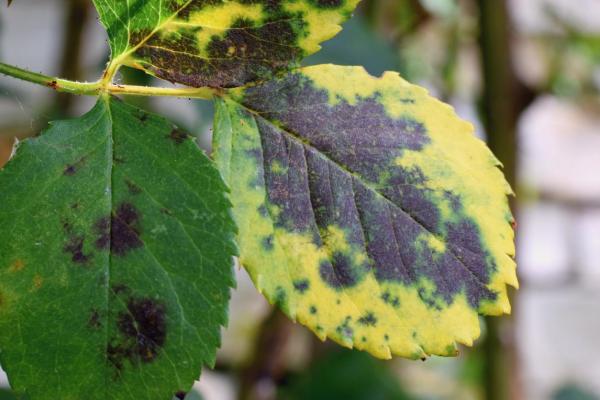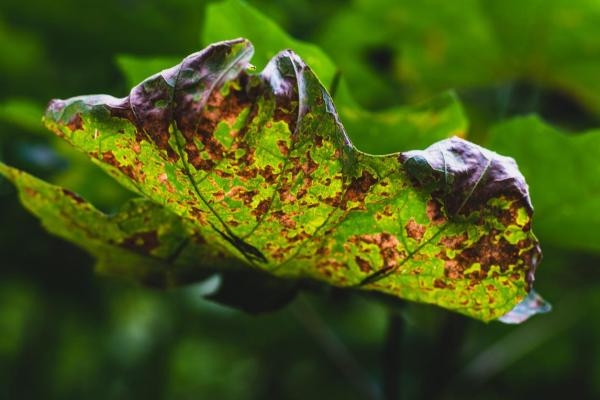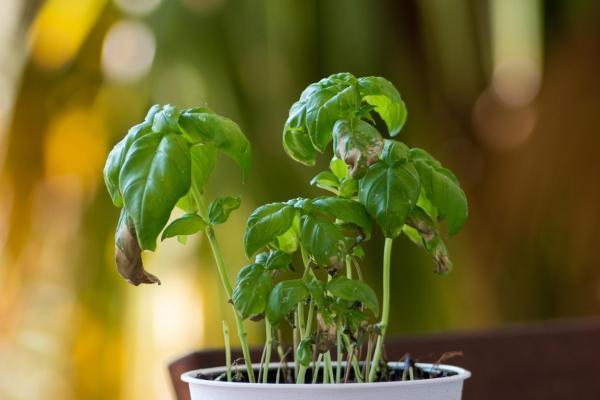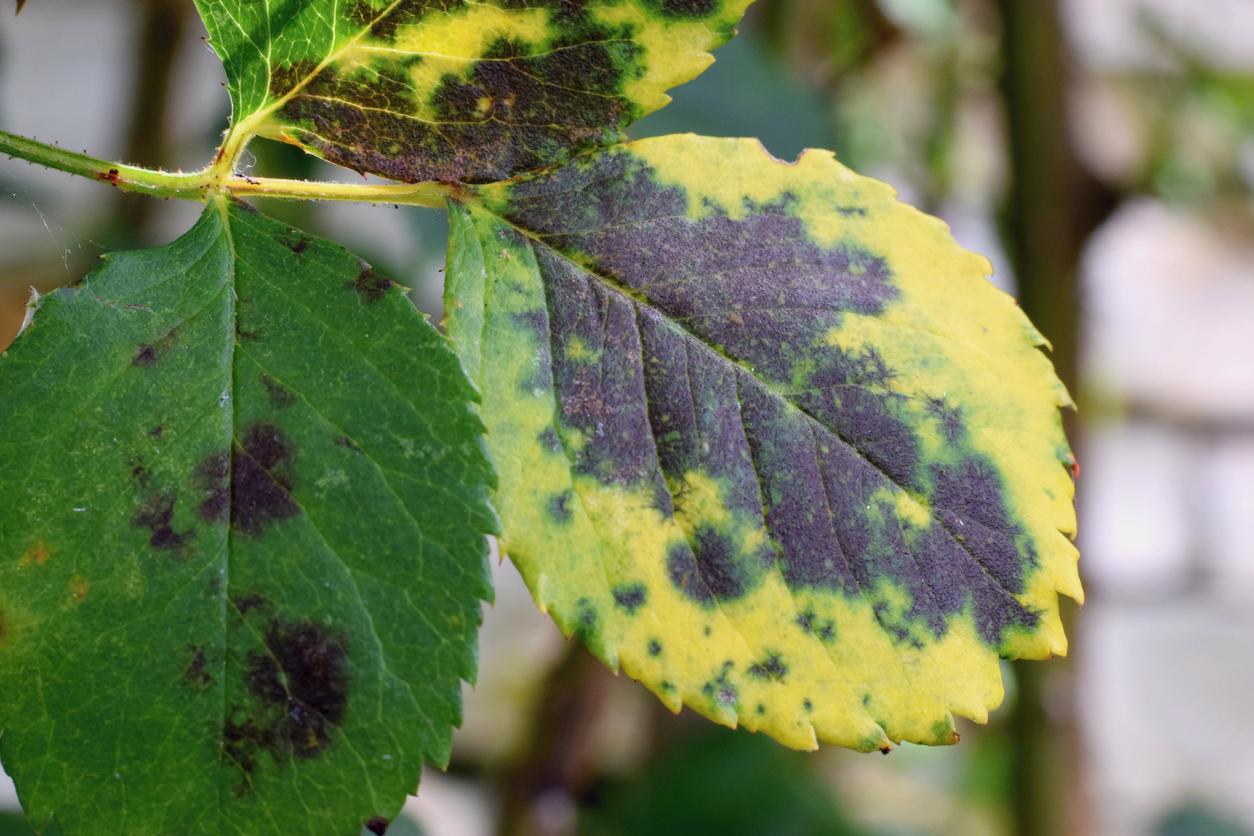My Plant Leaves Are Turning Black


Every leaf is a particular color due to the type of pigmentation found in the cell vacuoles. The most common green leaf is due to the presence of chlorophyll. Darker leaves or leaves of a different color will also contain chlorophyll for photosynthesis, but they also contain other pigments. In the case of leaves with a dark purple or black color, the reason for this hue is the presence of anthocyanins. This color pigmentation can be in all of the leaf or only in parts, the latter being the cases with variegated leaves.
Having black colored leaves on a plant is fine if this is their natural pigmentation. However, this is not the case if my plant leaves are turning black. oneHOWTO explains why plant leaves turn black and what we can do to stop it.
Lack of irrigation
Especially when the tips of a plant's leaves start turning black, we should ask ourselves whether we are watering them enough. Water is one of the basic needs of a plant. Without water the plant's organism will start to dry out and decay. Normally, we can see this if the leaves start turning yellow or brown. They can turn dark, depending on the initial coloration of the plant, so they can look black in certain lights.
It is possible to see your plant leaves turning black if they are over-watered. When too much water saturates the soil, it can lead to the integrity of the plant matter failing. In these cases, we will need to let the plant dry out and only water when needed.
Too much sun
As with water, the amount of light a plant receives is important. Some plants are best kept indoors because they need low light. Some will be damaged if they are exposed to direct sunlight for long periods of time. When you see dark spots appear on your plant's leaves, it could be due to receiving too much light. These can turn black in the right circumstances.
Another issue with a plant's leaves and sun exposure is due to watering. When the plant's leaves are sprayed with water and exposed to direct sunlight, it can cause them to burn. This is because the water intensifies the sun's rays and results in black spots appearing. For this reason, we should only water the substrate of the plant and do so in the morning or evening when the sun is at its lowest.
Fungi and bacteria
The most common cause of plant leaves turning black is due to fungus. The area which turns black will depend on where the fungus is present. This means the tips of the leaves can start turning black or the fungus can spread from the center.
Different types of fungus cause different colorations in the leaves. Downy mildew can cause yellowing of the leaves, but powdery mildew will cause the leaves to turn white. A type of fungus called black spot causes black, grey or dark brown spots to appear on the leaves. Once the fungus spreads enough, it will result in the more areas of the leaf from turning black.
Leaf fungus can affect both indoor and outdoor leaves. Since the fungal infection can spread, it is important we remove any affected leaves. Time is important. If we don't remove them quickly enough, the fungus can kill the plant's organism.
These guidelines are applicable to plants in general. If you want to look at some more specific guidelines, take a look at our article on how to care for a ponytail palm plant.

Plant pests
Aphids, caterpillars, spider mites or whitefly are some of the arthropods which will damage a plant in large enough numbers. On many occasions, fungus and parasites can attack a plant at the same time. In these cases, the fungus may be causing the leaves to turn black, but the parasites will still pose a problem. When the two work in tandem, the result will be a quicker death of the plant.
If you think your plant is turning black due to pests, you will need to know how to combat them. For this purpose, take a look at our article on how to get rid of pests on plants naturally.
High humidity
Warm temperatures, high humidity and poor ventilation can contribute to your plant's leaves changing color. These three factors work together to create an environment conducive to black spots appearing on plants. This is because they promote the proliferation of bacteria, fungi and pests.
This often occurs in indoor plants during the winter periods. This is because we keep the windows closed, turn the indoor heating up and increase the humidity. The same can happen with outdoor plants when they are planted in pots or flowerbeds which don't allow proper air circulation.
Unsuitable substrate
When there is no obvious cause to explain black spots appearing on plants, the reason may be in the substrate that supports and feeds them. The alkalinity or acidity of the soil influences the plant's growth. To stop the appearance of these spots, it may be necessary to correct the pH of the soil.
You should also check nothing is negatively affecting the roots. When the roots are constricted, it prevents the normal development of the plant. A stony substrate, underground pipes or similar can affect root growth. This could be the reason why the water and nutrients it needs are not reaching the plant. As a consequence, black spots appear because it has started to dry out. Again, a change of location could be the solution.
Excess of plant fertilizer
Regular fertilization of flowers, trees and shrubs is a necessary measure for them to grow healthy and carry out the flowering process. However, too much fertilizer can backfire and ‘burn’ plant leaves from the inside. If you detect black spots, check that you use the correct fertilizer for your plants and that you do so using the right amount.

How to treat black leaves on plants
Adopting preventive measures that prevent your plants from deteriorating is always the best option. In order for them to grow healthy and beautiful, you must put them in the right place, water sufficiently and use fertilizer appropriately. We will also need to monitor ventilation and observe for signs of parasites, fungus, etc. Even with these measures in place, it is possible for black spots to appear. In this case, acting quickly is essential.
To try to restore the health of your plant, here are some tips which need to be taken into account:
- Fungicides are essential if black spots on plant leaves are caused by fungi or bacteria. Apply them by spraying over the entire plant and focusing especially on the most affected areas. Remember that you can make homemade fungicides for plants based on bicarbonate of soda or vinegar diluted in water.
- If the stain presents on a large area of the plant leaf, it is preferable to remove the affected leaf to prevent the infection from spreading throughout the plant or to nearby plants. When the tips or other sections of leaf have turned black or brown due to sun exposure, it is best to remove these sections also.
- Don't forget to remove fallen leaves from the pot or garden soil to prevent the spread of the disease. Similarly, keep the tools you use in the garden clean.
Especially for indoor plants, leaves can become dirty due to detritus in the home. For this reason, we may need to clean them manually. We show you how it's done in our article on how to clean houseplant leaves.
If you want to read similar articles to My Plant Leaves Are Turning Black, we recommend you visit our Gardening & plants category.







